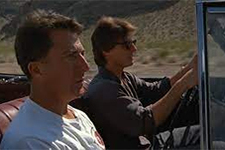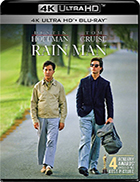Rain Man (4K UHD)
|  In today’s cinematic universe, where the box office is topped year after year by superhero, science fiction/fantasy, and computer-animated films, it is hard to believe that, back in 1988, right in the middle of the Reagan-era, high-octane, high-concept blockbuster era, the highest grossing film was Rain Man, a drama about a selfish businessman (Tom Cruise) who, after the death of his father, learns that he has an autistic-savant brother (Dustin Hoffman). The previous year’s box office toppers were the expected mix of action, fantasy, and comedy—Return of the Jedi (1983), Ghostbusters (1984), Back to the Future (1985), Top Gun (1986), and Three Men and a Baby (1987)—which made Rain Man stand out all the more. (Although, interestingly, the last time a straight drama topped the box office was in 1979 with the family drama Kramer vs. Kramer, for which Hoffman won his first Oscar and which was also the last time the #1 film at the U.S. box office also won the Oscar for Best Picture, an event that wouldn’t happen again after Rain Man until James Cameron’s Titanic in 1997.) Looking back on it now, the pairing of Hoffman and Cruise was lightning in a bottle, although on the surface it seemed like an utterly incongruous pairing, which is beautifully encapsulated in the film’s one-sheet, which uses an image from the film of Hoffman’s Raymond Babbitt and Cruise’s Charlie Babbitt walking down a tree-lined street. Raymond walks upright, hands to his sides, his white socks showing beneath his too-short pants, beige jacket zipped almost to his neck, a slightly blank stare on his face, while Charlie is swaggering, one hand in his pocket, fashionable sunglasses hiding his eyes and matching his black-on-black sport-coat and shirt. They are a portrait in opposites—as both characters and Hollywood stars—although the film’s simple beauty is the way it ultimately shows what a perfect pair they make. At the time, both actors were at the top of their respective games. Cruise had recently graduated from adolescent hits like Risky Business (1983) to the adult blockbuster with his iconic turn in Top Gun (1986), although he was already showing a proclivity toward risk and challenge with his role in Martin Scorsese’s The Color of Money (1986) opposite Paul Newman, where he put his cocky persona to darker use. Hoffman, who had exploded onto the scene 20 years earlier with his versatile Oscar-nominated roles in The Graduate (1967) and Midnight Cowboy (1969), was riding a wave of critical success with Kramer vs. Kramer, Tootsie (1982), and the Emmy-winning Death of a Salesman (1985), although his most recent film was the critical and commercial disaster Ishtar (1987). The script for Rain Man, by Ron Bass and Barry Morrow, had been in development for years, with various directors (including Steven Spielberg) attached at different times. Morrow had originated the project, and it bears some resemblance to a pair of television movies he had written—Bill (1981) and Bill: On His Own (1983)—that were based on his own experiences being the friend and guardian of a man with cognitive disabilities The project eventually wound up with Barry Levinson, who had just scored a major hit with the Robin Williams vehicle Good Morning, Vietnam (1987) and previously directed the ensemble coming-of-age drama Diner (1982), the Robert Redford melodramatic sports weepie The Natural (1984), and the Spielberg-produced action-fantasy Young Sherlock Holmes (1986). His track record was solid, and it turned out that Rain Man was an ideal vehicle that made good use of his understanding and appreciation of offbeat characters and conflict. The film introduces us to Charlie Babbitt as a self-involved businessman whose specialized business importing expensive foreign sports cars is on the brink of collapse, as is his relationship with his girlfriend, Susanna (Valeria Golino), who clearly wants to connect with him, but finds it almost impossible because he is so drawn into himself and his own concerns. A weekend getaway is cancelled when Charlie receives the news that his wealthy, estranged father, who he has not seen since he left home more than a decade ago, has died. Charlie returns to his hometown in Ohio to attend the funeral and the reading of the will. It turns out that his father’s millions have gone into a trust for an unnamed person and all Charlie got was his father’s beloved 1949 Buick Roadmaster convertible, a beautiful car to be sure, but also one that carries a great deal of emotional baggage because Charlie’s dad left him in jail for several days when he took a joyride in it as a teenager. Thus, in virtually every way, Charlie’s father is sticking it to him from the grave. Charlie soon learns that the unnamed inheritor of his father’s wealth is his older, autistic brother Raymond—a brother he never even knew he had. Angry at his father for years of emotional punishment and denying him any inheritance, Charlie makes the snap decision to take Raymond out of the institute were he has lived for decades and drive him back to Los Angeles. It isn’t exactly kidnapping because Raymond is there voluntarily, but Charlie is nevertheless using Raymond as leverage to try get his share of the inheritance—a deeply selfish and potentially dangerous move given the manner in which Raymond’s autism keeps him in an isolated inner world driven by routines and familiarity that a spontaneous roadtrip across the U.S. is bound to disrupt in all the worst ways. Nothing about Raymond can or will change, a point that is made by his physician, Dr. Bruner (Jerry Molen); but, it doesn’t matter to Charlie, who only sees red and has no intention of letting anything get in the way of his getting what he thinks he deserves. Thus, Rain Man takes the form of that most traditional of American narratives: the cross-country road trip. The majority of the film takes place inside that Buick Roadmaster on the back highways of flyover country. Ace cinematographer John Seale, who had worked extensively with director Peter Weir in both his native Australia and the U.S. (his first Oscar nomination was for Weir’s 1985 thriller Witness), punches up the film’s visuals without being showy or ostentatious. There are certainly some beautiful magic hour shots of the open highway, but Seale’s imagery feels organic to the journey, reflecting in various ways Charlie’s character growth (it is not incidental that we first see him in a distorted reflection on the shiny surface of a Lamborghini). Because Raymond is essentially unchanging—incapable of character growth or adaptation—Rain Man runs the risk of dramatic stasis, as we are denied one of the fundamental pleasures of good drama. Granted, Cruise’s character is the obvious focal point for a broad character arc, and he does learn a great deal about caring for someone other than himself via his experience road-tripping from Ohio to Los Angeles with Raymond. Charlie begins as someone who is so self-centered he can barely sustain a conversation if it isn’t to his benefit, and by the end he genuinely wants to be with and care for Raymond, an endeavor that he is ill-suited for, which gives the film a heady dose of bittersweet reality at the end. Despite a few subtle nods toward displays of affection (a very gentle tilting of his head near the end being the most poignant), Raymond is incapable of what we would consider real human connection. He is a creature of habit and repetition, whose behavioral tics and obsessions with structure are coping mechanisms that only he understands. Hoffman, who won a second Oscar for his performance, walks a tricky line, as he must remain true to the realities of autism while also adhering to some tried-and-true Hollywood tropes. Raymond is alienating, but he can’t be too alienating, which is why the film often plays his behaviors for humor—not at Raymond’s expense, but rather in Charlie’s incredulous responses to them. The film also leans heavily into Raymond being an autistic savant, which means that he has extraordinary intellectual abilities that allow him to perform complex calculations with almost superhuman speed and accuracy. Charlie, of course, exploits this at one point to count cards in a Las Vegas casino, but the film manages to play this off as a bonding situation between the brothers, one that still remains truthful to Raymond’s condition when he responds in a less than ideal way to Charlie’s desire to give him a hug. Part of the film’s dramatic strength is the way it conveys Charlie’s emotional frigidity—previously displaced onto a calculated drive to make money, money, money—as the father’s legacy that his growing relationship with Raymond allows him to shed. He is genuinely a better man in the film’s final frames, which stamps the film’s touching conclusion with a sense of optimism that feels genuinely earned.
Copyright © 2023 James Kendrick Thoughts? E-mail James Kendrick All images copyright © MVD Visual / MGM/UA | |||||||||||||||||||||||||||||
Overall Rating: 


 (3.5)
(3.5)


